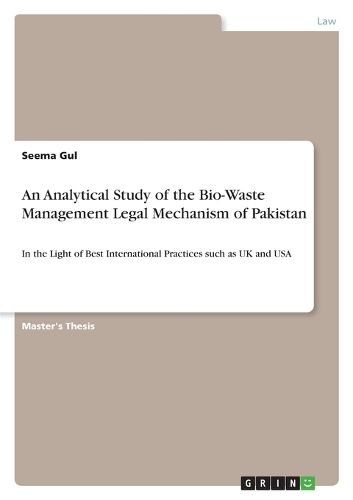Readings Newsletter
Become a Readings Member to make your shopping experience even easier.
Sign in or sign up for free!
You’re not far away from qualifying for FREE standard shipping within Australia
You’ve qualified for FREE standard shipping within Australia
The cart is loading…






Master's Thesis from the year 2022 in the subject Law, International Islamic University (International Islamic University Islamabad), course: LLM, language: English, abstract: Rapid population expansion, urbanization, industry, modernization, and digitalization in the twenty-first century result in a surge in wastes such as domestic, industrial, commercial, mining, radioactive, agricultural, hospital, and electronic wastes, among others. Managing these wastes is becoming a major issue across the world. The process of collecting, transporting, separating, disposing of, destroying, processing, recycling, managing, monitoring, and regulating garbage, sewage, and other waste products is known as waste management. The primary goal of waste management is to preserve the environment from harmful impacts, keep it clean, and protect people's health from harmful consequences. Many contemporary ways are being used across the world to handle these wastes. They include biological reprocessing, recycling, dumping in sanitary landfills, composting, waste to energy, bioremediation, incineration, pyrolysis, plasma gasification, ocean/sea disposal, and so on. These waste management strategies improve the environment's suitability for the survival of living things. This also allows future generations to live in a calm and healthy environment. Finding and implementing the finest waste management strategy is an urgent necessity, as is the wellbeing of the world's population. The waste management procedure will become much more effective and successful as a result of this. Numerous waste management strategies have been used in various regions of the world. Furthermore, by critically examining the debate and conclusions of the other researcher's work, it attempts to offer the optimal waste management techniques.
$9.00 standard shipping within Australia
FREE standard shipping within Australia for orders over $100.00
Express & International shipping calculated at checkout
Master's Thesis from the year 2022 in the subject Law, International Islamic University (International Islamic University Islamabad), course: LLM, language: English, abstract: Rapid population expansion, urbanization, industry, modernization, and digitalization in the twenty-first century result in a surge in wastes such as domestic, industrial, commercial, mining, radioactive, agricultural, hospital, and electronic wastes, among others. Managing these wastes is becoming a major issue across the world. The process of collecting, transporting, separating, disposing of, destroying, processing, recycling, managing, monitoring, and regulating garbage, sewage, and other waste products is known as waste management. The primary goal of waste management is to preserve the environment from harmful impacts, keep it clean, and protect people's health from harmful consequences. Many contemporary ways are being used across the world to handle these wastes. They include biological reprocessing, recycling, dumping in sanitary landfills, composting, waste to energy, bioremediation, incineration, pyrolysis, plasma gasification, ocean/sea disposal, and so on. These waste management strategies improve the environment's suitability for the survival of living things. This also allows future generations to live in a calm and healthy environment. Finding and implementing the finest waste management strategy is an urgent necessity, as is the wellbeing of the world's population. The waste management procedure will become much more effective and successful as a result of this. Numerous waste management strategies have been used in various regions of the world. Furthermore, by critically examining the debate and conclusions of the other researcher's work, it attempts to offer the optimal waste management techniques.